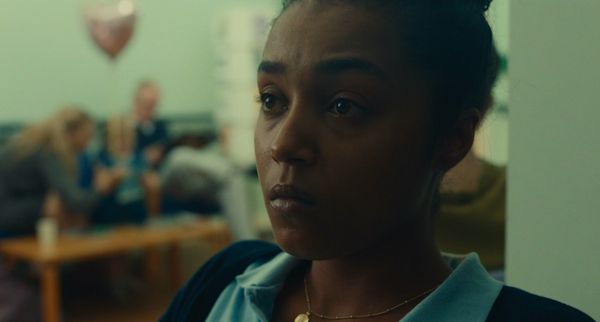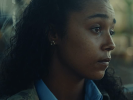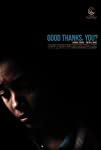Eye For Film >> Movies >> Good Thanks, You? (2020) Film Review
Good Thanks, You?
Reviewed by: Jennie Kermode

Amy (Jasmine Jobson) is 16 when it happens. We don't see it directly; we don't need to. As she rounds the corner of the building, emerging from the shadows, what has happened is obvious from the look on her face. That awkwardness, that difference about her remains throughout Molly Manning Walker's short film, provoking suspicion and discomfort in those around her until one wonders if they are wilfully ignoring the most likely interpretation because of the pain it could cause to them.
The expression referenced in the title here is one that survivors of multiple types of trauma will wince at. Amy doesn't know how to talk about what has happened to her friends or her boyfriend Lewis (Micheal Ward), or even if doing so would be welcome, so she deflects. She does, however, report the crime. What follows is a series of additional traumatic interrogations which all too often centre her, not her attacker, as the cause of the problem. These sequences might have been more effective if they were a little less heavy handed but t is understandably difficult to get the balance right in light of how ridiculous some of the comments made to survivors by interviews are in real life.

Drawing on the director's own experience of sexual assault at the same age, the film follows that interview process only tangentially. Its focus is always on Amy's feelings, her attempts to cope with what has happened and also her attempts to move forwards in her life, knowing that when she does speak, she will never again been seen in the same way. Despite the short running time, we get a clear sense of the things that are important to her, the ordinary stuff of life for a teenager, now disrupted. This emphasises the harm done to her, illustrating the way that it extends beyond the physical and even beyond the psychological. When she speaks it will be the start of a process of recovery, the beginning of being a different person, not a solution in itself, and despite her youth she seems aware of this, steeling herself to make that leap.
This would be a lot to place of the shoulders of any actor. Jobson carries the film with remarkable confidence, showing us the weight of all that repressed emotion, looking at times as if words are about to explode out of her, at others - in the interrogation rooms - as if she has no faith that anything she says will be heard. Despite those difficult sequences, viewers will be willing her to speak, to reclaim control of her own narrative. This is a highly impressive calling card for its young star and a powerful piece of cinema in its own right.
Reviewed on: 19 Dec 2020















